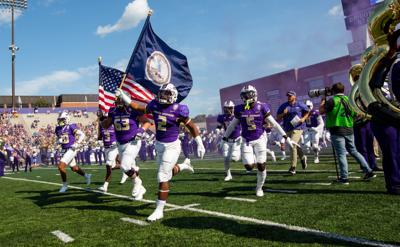A new Virginia state law signed by Governor Glenn Younkin Thursday in Richmond makes it illegal for the NCAA to punish players or schools in the Commonwealth for direct name, image and likeness (NIL) payments to college athletes.
Virginia is the first state to enact such a law, essentially overriding the NCAA’s authority to limit schools paying players. But at James Madison University’s Board of Visitors meeting held Thursday in Harrisonburg, the message coming from JMU officials was support for a movement toward a nationwide resolution to NIL, while also proceeding with caution.
“This gets messy,” outgoing athletic director Jeff Bourne said during the BOV’s athletic committee meeting. “The reason this gets messy is the legal side.”
The Virginia law, which goes into effect July 1, specifically states that athletes can’t be employees of their schools and can’t sue the school for harming their NIL value for reasons such as lack of playing time. It also specifies that student fees can’t go toward NIL payments to players.
Bourne is in the final weeks of his 25-year term leading JMU’s athletic department. The school announced Thursday that Eastern Kentucky’s Matt Roan would succeed Bourne, who indicated he was happy to hand off the responsibility of figuring out NIL to Roan. But he also indicated that JMU’s ongoing hope is to see JMU have an increased say in how NIL funds are handled.
“Having university involvement is JMU’s preference,” Bourne said. “It helps booster club and collective work together and helps keep tabs on what athletes are getting. The action out of the state of Virginia today makes us have to be much more acutely aware of where it is. This is the wild, wild west. People are able to do a lot. It’s going to force JMU to say, what can we afford to do long term?”
To that end, schools such as JMU have walked a tightrope in recent years with their donors, asking them to donate to both the JMU Duke Club — the university’s official sports fundraising arm that supports scholarships, facilities and other athletic department needs — along with the newer Montpelier Collective — an NIL group that, for now, at least, complies with NCAA rules because it isn’t officially connected the school.
Administrators see the need to keep money flowing to the Duke Club while coaches are more likely to push donors toward the collective, which helps them build competitive rosters.
The new Virginia law, which most experts expect will prompt other states to follow suit, could allow the Duke Club and Montpelier Collective to work in joint efforts.
“We’re at a unique time with NIL,” Scooter Renkin, the head of the Duke Club, told the Board. “I’m being asked more and more, where do you want our money? It’s definitely something that I see as a challenge going forward. I may have some involvement in the NIL going forward. Obviously NIL is dollars in pockets (for athletes), but I still say a JMU degree is the most valuable thing you’re going to leave here with.”
Under current NCAA rules, schools can’t have direct involvement with the collective, but the Virginia law could change that. For instance, in theory JMU could offer Duke Club priority points used for better seats and parking at football and basketball games to fans who donate to the collective.
It’s expected the NCAA will eventually have to restructure its rulebook to comply with Virginia and any other state that introduces similar laws. But in the meantime complications still exist.
As pointed out to the board by JMU compliance director Stephen LaPorta, should the collective become a part of the university, it would become part of the school’s Title IV compliance equation. Also on Thursday, the Sun Belt Conference sent a letter to its schools, which includes JMU and Old Dominion in Virginia, emphasizing it expects members to adhere to NCAA rules.
“Direct compensation of the student athlete is still a violation of NCAA rules,” LaPorta said. “That has not been enjoined by any federal legislation, so while Virginia state law says it’s permissive, the NCAA would say otherwise. That is something we did receive today from the conference office.”


(0) comments
Welcome to the discussion.
Log In
Keep it Clean. Please avoid obscene, vulgar, lewd, racist or sexually-oriented language.
PLEASE TURN OFF YOUR CAPS LOCK.
Don't Threaten. Threats of harming another person will not be tolerated.
Be Truthful. Don't knowingly lie about anyone or anything.
Be Nice. No racism, sexism or any sort of -ism that is degrading to another person.
Be Proactive. Use the 'Report' link on each comment to let us know of abusive posts.
Share with Us. We'd love to hear eyewitness accounts, the history behind an article.